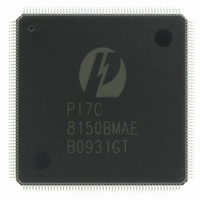PI7C8150BMAE Pericom Semiconductor, PI7C8150BMAE Datasheet - Page 53

PI7C8150BMAE
Manufacturer Part Number
PI7C8150BMAE
Description
IC PCI-PCI BRIDGE ASYNC 208-FQFP
Manufacturer
Pericom Semiconductor
Datasheet
1.PI7C8150BNDE.pdf
(109 pages)
Specifications of PI7C8150BMAE
Applications
*
Interface
*
Voltage - Supply
*
Package / Case
208-FQFP
Mounting Type
Surface Mount
Maximum Operating Temperature
+ 85 C
Minimum Operating Temperature
0 C
Mounting Style
SMD/SMT
Operating Supply Voltage
3 V to 3.6 V
Supply Current (max)
510 mA
Lead Free Status / RoHS Status
Lead free / RoHS Compliant
Available stocks
Company
Part Number
Manufacturer
Quantity
Price
Part Number:
PI7C8150BMAE
Manufacturer:
PERICOM
Quantity:
20 000
Note: If parity checking is turned off and data parity errors have occurred for queued or
subsequent delayed write transactions on the initiator bus, it is possible that the initiator’s
re-attempts of the write transaction may not match the original queued delayed write
information contained in the delayed transaction queue. In this case, a master timeout
condition may occur, possibly resulting in a system error (P_SERR_L assertion).
For downstream transactions, when PI7C8150B is delivering data to the target on the
secondary bus and S_PERR_L is asserted by the target, the following events occur:
Similarly, for upstream transactions, when PI7C8150B is delivering data to the target on
the primary bus and P_PERR_L is asserted by the target, the following events occur:
A delayed write transaction is completed on the initiator bus when the initiator repeats the
write transaction with the same address, command, data, and byte enable bits as the
delayed write command that is at the head of the posted data queue. Note that the parity bit
is not compared when determining whether the transaction matches those in the delayed
transaction queues.
Two cases must be considered:
For downstream delayed write transactions, when the parity error is detected on the
initiator bus and PI7C8150B has write status to return, the following events occur:
If the parity-error-response bit corresponding to the initiator bus is set, PI7C8150B
asserts TRDY_L to the initiator and the transaction is not queued. If multiple data
phases are requested, STOP_L is also asserted to cause a target disconnect. Two cycles
after the data transfer, PI7C8150B also asserts PERR_L.
If the parity-error-response bit is not set, PI7C8150B returns a target retry.
It queues the transaction as usual. PI7C8150B does not assert PERR_L.
In this case, the initiator repeats the transaction.
PI7C8150B sets the detected-parity-error bit in the status register corresponding to the
initiator bus, regardless of the state of the parity-error-response bit.
PI7C8150B sets the secondary interface data parity detected bit in the secondary status
register, if the secondary parity error response bit is set in the bridge control register.
PI7C8150B captures the parity error condition to forward it back to the initiator on the
primary bus.
PI7C8150B sets the primary interface data-parity-detected bit in the status register, if
the primary parity-error-response bit is set in the command register.
PI7C8150B captures the parity error condition to forward it back to the initiator on the
secondary bus.
When parity error is detected on the initiator bus on a subsequent re-attempt of the
transaction and was not detected on the target bus
When parity error is forwarded back from the target bus
PI7C8150B first asserts P_TRDY_L and then asserts P_PERR_L two cycles later, if
the primary interface parity-error-response bit is set in the command register.
Page 53 of 109
ASYNCHRONOUS 2-PORT PCI-TO-PCI BRIDGE
ADVANCE INFORMATION
April 2009 – Revision 1.08
PI7C8150B











